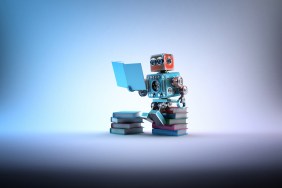Photo: Replicas of the robots from the music video of the single All Is Full of Love, displayed at the Björk retrospective at the Museum of Modern Art, New York City. Source: Flickr: Bjork at MOMA, courtesy of Wikimedia Commons.
“Our generation will have to deal with tens of millions of jobs replaced by automation like self-driving cars and trucks,” Harvard dropout and Facebook founder Mark Zuckerberg told Harvard’s class of 2017 during the commencement speech on May 25. He glossed over that number rather casually, as though it didn’t effect the people he was speaking to in any discernible way.
Also: Elon Musk Reveals Plans to Colonize Mars
Just one day earlier, Katja Grace at the Future of Humanity Institute at the University of Oxford and four other researchers published, “When Will AI exceed Human Performance? Evidence for AI Experts” available at the Cornell University Library.

Source: “When Will AI exceed Human Performance? Evidence for AI Experts”
The researchers surveyed 1,634 of the world’s leading experts in the field artificial intelligence in order to determine the time frame for the replacement of human beings by machines. Their findings went from disturbing to bleak rather quickly.
Experts predict that over the next decade, artificial intelligence (AI) will outperform humans at translating languages (by 2024), writing high school essays (by 2026), and driving trucks (by 2027). Moving a little further into the future, experts predict AI will replace humans working in retail (2031), writing New York Times bestsellers (2049), and doing surgery (2053).
If you thought outsourcing was bad, you ain’t seen nothing yet.
The study concludes, “Researchers believe there is a 50% chance of AI outperforming humans in all tasks in 45 years and of automating all human jobs in 120 years, with Asian respondents expecting these dates much sooner than North Americans.”
Indeed, last year a Japanese AI program penned a novel titled, The Day A Computer Writes A Novel, which passed the first round for a national literary prize. Although it didn’t win, it showed great promise with its abilities to produce original content autonomously.
It seems to be a harbinger of things to come, a sense that perhaps artificial intelligence was not the smartest idea human beings ever had.
One week after Grace’s study was published, the MIT Technology Review suggested we take these findings with a grain of salt, stating, “The 40-year prediction horizon should always raise alarm bells…. Forty years is an important number when humans make predictions because it is the length of most people’s working lives. So any predicted change that is further away than that means the change will happen beyond the working lifetime of everyone who is working today.”
At the same time, we have watched what has happened to the U.S. economy as a result of outsourcing and it seems irrational to conclude that taking jobs out of the hands of able citizens could be positively construed.

George the humanoid robot from the 1930s was constructed by motor engineer Alan Herbert Reffell and Captain W. H. Richards. Captain and journalist William H. Richards was secretary of the Exhibition of the Society of Model Engineers. The picture shows Captain W. H. Richards. Courtesy of the German Federal Archives/Wikimedia Commons.
Miss Rosen is a journalist covering art, photography, culture, and books. Her byline has appeared in L’Uomo Vogue, Vogue Online, The Undefeated, Dazed Digital, Aperture Online, and Feature Shoot. Follow her on Twitter @Miss_Rosen.








